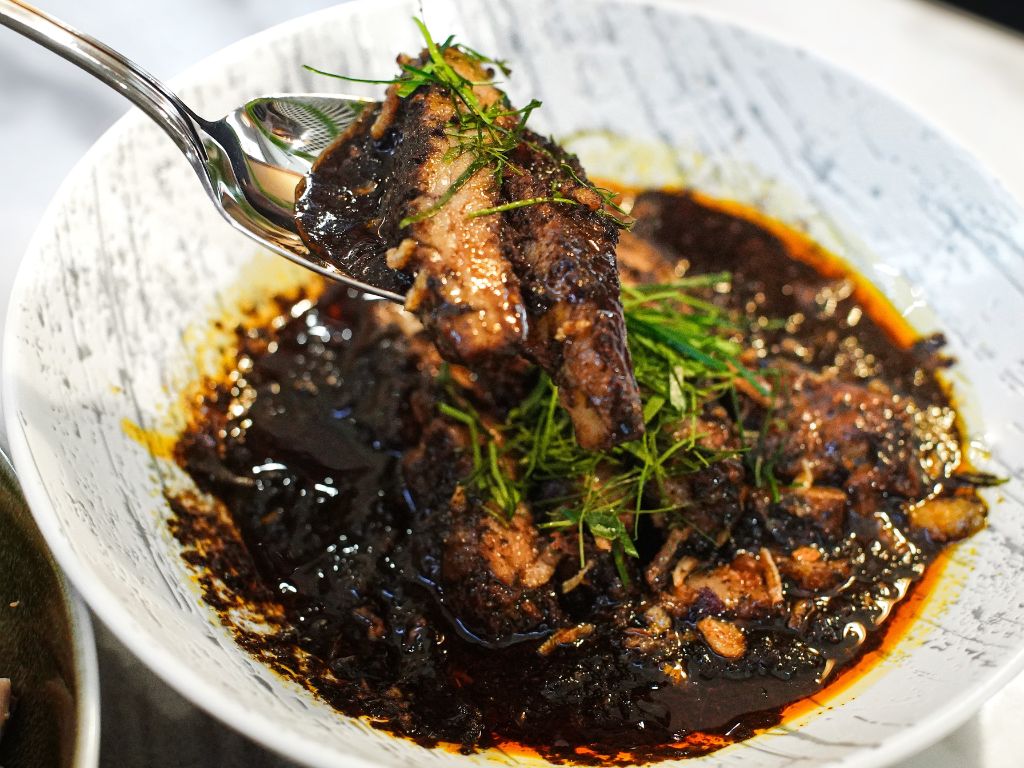Popular Peranakan restaurant Godmama opens second outlet at Parkway Parade

Godmama would probably be a familiar name to anyone who appreciates Peranakan food. Since its inception in June 2019, the Funan stalwart has grown into one of Singapore’s most popular Peranakan restaurants.
There’s little wonder why, since Godmama is a restaurant based on familial warmth and the comforting flavours of home — crucial factors in the crafting of scrumptious Peranakan food.

In fact, the name is an homage to two women who had greatly influenced owner Christina Keilthy: Her godmother (“godma”) and mother (“mama”).
Here’s some good news for easties: After five fruitful years at its Funan stronghold, Christina and chef Frederic Goh, who is also co-owner, decided to expand and recently opened a second Godmama in Parkway Parade!
The new space is located on the first floor of the Marine Parade mall, in a cosy and understated semi-open alcove that’s punctuated with tasteful touches of Perankan motifs.
The simple comforts

There are always classics in every cuisine and for Peranakan, otak-otak (fish paste grilled in banana leaf, S$9.90) is certainly up there.
Godmama at Parkway Parade serves a more-than-solid rendition of the classic, using marinated Spanish mackerel, coming out silky and bouncy with the right amount of richness and spice nuance.

If you’re feeling really snacky, the ikan keropok (crispy fish crackers, S$6.90) are a must-order.
Each piece crackles with gusto and the homemade belacan mayo is also dangerously addictive — it got us hooked.

The ngoh hiang (S$11.90) at Godmama is also pretty tasty, with each slice loaded with a generous blend of fresh prawns, minced meat and water chestnut.
Another classic that we quite enjoyed on Godmama’s menu was the sambal udang petai (prawns cooked in sambal and stink beans, S$23.90) with QQ prawns swimming in a moreish sauce.
Godmama’s heavy-hitters

Other than the tried-and-tested, Godmama also showcases intriguing interpretations of classic flavours.
Compared to the more ubiquitous ayam buah keluak, the restaurant’s pork jowl buah keluak (S$23.90) uses fattier cuts of pork jowl as the protein base.
It lends a richer and more luscious texture to the buah keluak (candlenut seed) stew’s earthy complexity and umami — though the concoction feels a touch less intense than what you’d find elsewhere.

For those who enjoy assam fish, there’s also the ikan masak nanas (S$22.90), that drenches grilled barramundi cooked in a tangy tamarind-pineapple sauce.
It’s essentially a more vibrant cousin of your usual assam fish, with pineapple twang and sweetness supplementing the assam’s own distinct tartness.

Another less common Perankan dish at Godmama is the Parkway Parade-exclusive crayfish nyonya yellow mee (S$23.90) — a dish that’s also known as “birthday noodles” and usually only prepared for that one special day every year.
Cooked by simmering thick yellow noodles in a house-made stock fashioned out of prawn shells, chicken and pork bones, it’s somewhat similar to Hokkien mee in profile and makes for a nostalgic slurp.

Of course, you have to finish with dessert and the pulut hitam panna cotta (S$10.90) is probably one of the most unique ones on Godmama’s menu.
This smart twist features velvety panna cotta in a pool of fragrant pulut hitam (black glutinous rice). Simple and hearty but unique take on a traditional dessert.
And that’s probably the best way to describe Godmama: Simple and homely Peranakan dishes that may not be winning any Michelin stars soon but would likely charm anyone who enjoys a nostalgic feast.
This was a hosted tasting.
For more ideas on what to eat, read our stories on
Godmama is on the GrabFood delivery service and offers free delivery (up to S$3 off) with GrabUnlimited.
Do explore the new GrabFood Dine-in service for awesome deals.
You can also book a ride to Godmama at Parkway Parade
Godmama (Parkway Parade)
Parkway Parade, 01-69A, 80 Marine Parade Road
Nearest MRT: Marine Parade (opening Jun 23 2024)
Open: Monday to Friday (11am to 10pm), Saturday to Sunday (10.30am to 3pm, 3pm to 10pm)
Parkway Parade, 01-69A, 80 Marine Parade Road
Nearest MRT: Marine Parade (opening Jun 23 2024)
Open: Monday to Friday (11am to 10pm), Saturday to Sunday (10.30am to 3pm, 3pm to 10pm)




